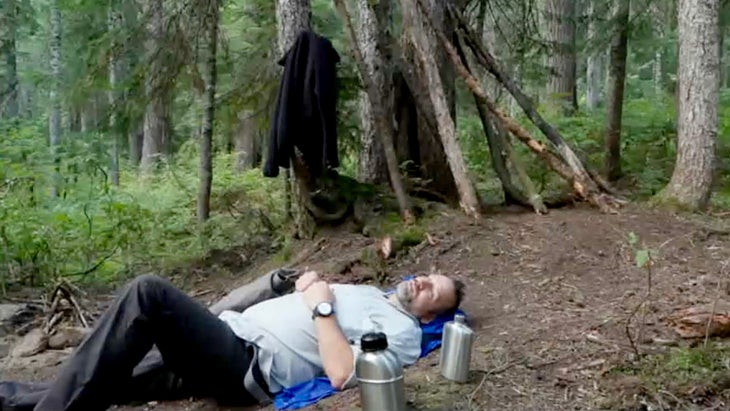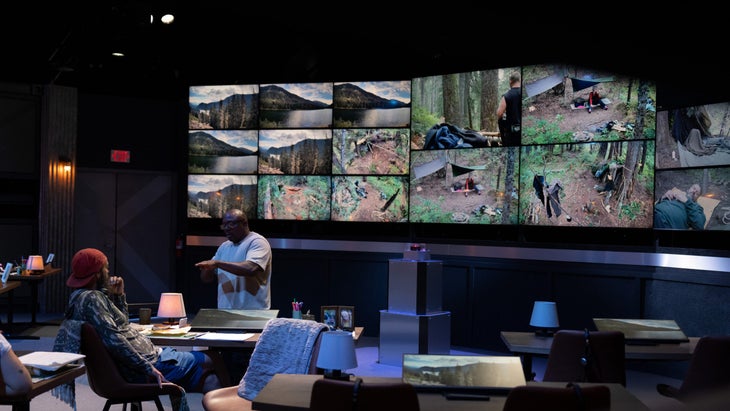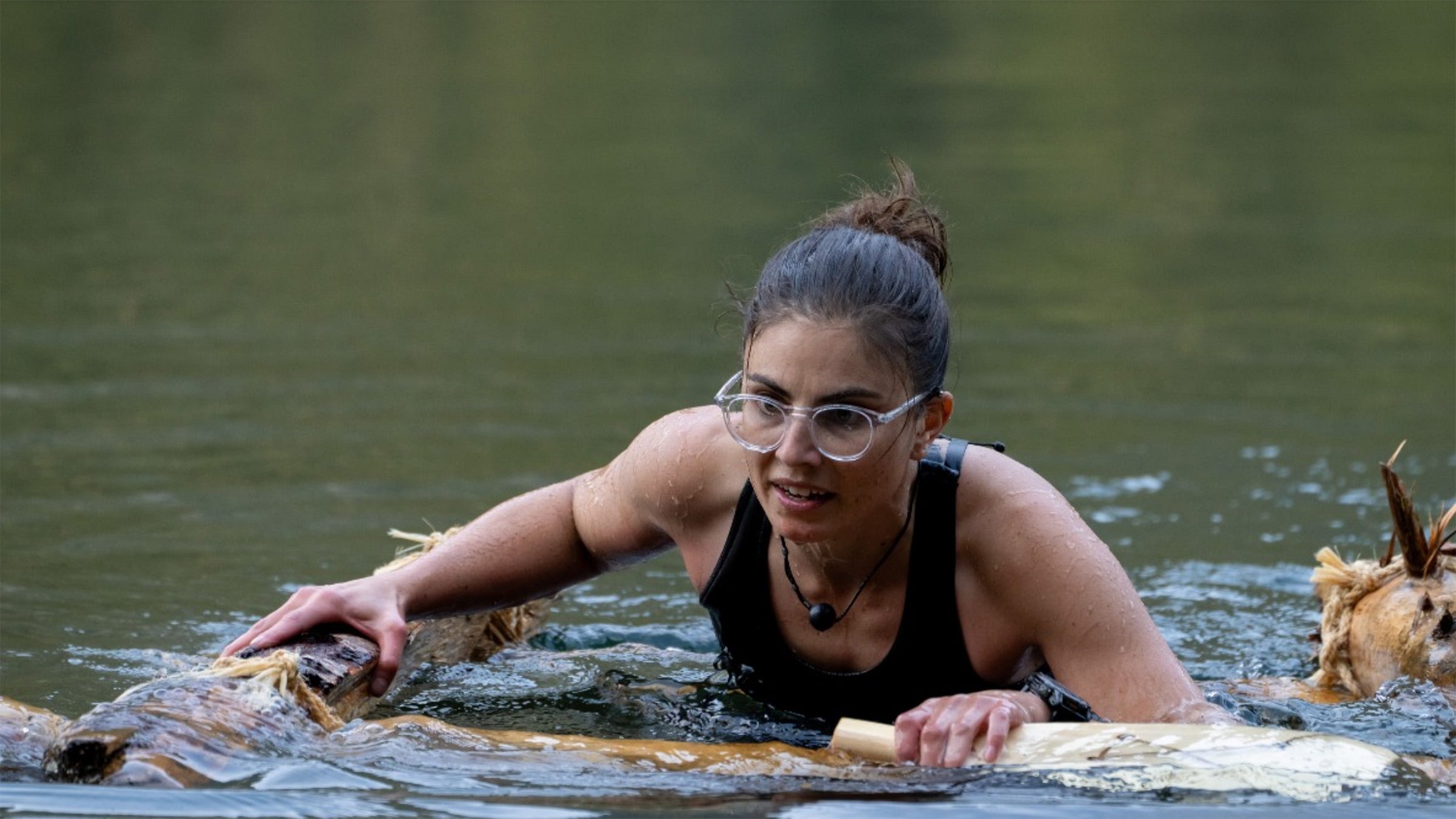Things are not going well for Woody.
The 50-year-old retired cop is thirsty and exhausted, and his attempts to spark a campfire using a ferro rod have failed miserably. Now, Woody can’t boil his drinking water. He stands in his barren campsite and raises a canteen filled with untreated pond water to his lips. “Lord, please don’t let me get sick,” he says into a camera.
The shot cuts to the cozy confines of a television studio. Woody’s son, Blake, and his nephew, Colin watch him gulp down the nasty beverage on a massive television screen. Colin shakes his head and buries his face in his palms.
And, cut!
This scene is the climax of episode 1 of ����ٰ������ٱ��,��a new outdoor survival show that debuted on Fox this past Monday. I recently watched the opening episode, as well as advanced screeners for episodes two and three, with my mouth agape. As a longtime fan of wilderness survival shows—you know, programs like Alone, Naked and Afraid, and Man vs. Wild—Extracted marks a stark turning point for the genre. Apparently, TV producers are now shipping everyday schmoes with zero wilderness training into the backwoods and filming them as they contract Giardia. And they’re doing this for our entertainment.

This element isn’t even the weirdest part of Extraction—not by a long shot. The show’s central premise is like an psychological experiment.
Twelve “survivalists”—yes I use this term lightly—are plucked from small-town American and shipped off to a forested lake somewhere in British Columbia. They must stay there as long as possible, and the last one to remain wins $250,000. Producers have affixed dozens of surveillance cameras to the trees, rocks, and stumps in the area so we can spy on the 12 as they go about their business of building shelter, procuring food, going to the bathroom, and screaming into the void.
But here’s the real twist. A short distance away, producers have erected a TV studio, and each survivalist’s family members are stationed there, where they watch the action unfold 24 hours a day. At random points throughout the show, the family members are able to pack up survival gear—knives, cans of beans, bear spray—which are then delivered via flying drone to their loved one.
The survivalists themselves cannot tap out. That job can only be done by the family members in the studio. A family member must march to the center of the studio and push a big and ridiculous red button that says EXTRACT.

I won’t spoil the show, other than to say that this single rule creates the tension at the heart of ����ٰ������ٱ��.��Contestants beg to be removed, but their loved ones don’t always comply.
While watching Extracted I often thought about Blair Braverman’s recent column about our collective affection for survival TV. Braverman, herself a former contestant on Naked and Afraid, makes more than a few pointed conclusions about why the TV genre is so beloved: watching people in nature is relaxing; survival connects us to our hunter-gatherer roots; we love cheering for and against characters; watching the battle to survive is inherently relatable to everyday people.
“Negotiating jobs, health insurance, child and elder care, housing? That’s all survival, viscerally so,” Braverman wrote.
Alas, I fear that the survival genre is quickly moving away from the themes Braverman adores. Extracted comes on the heels of Netflix releasing its first two seasons of its own survival game show ���ܳٱ�������.��Both shows tap into emotions that are more sinister, and psychological reflexes inside us that are more ominous.
������Outlast, the survivalists wage psychological war on each other throughout the season by switching teams, stealing gear, and destroying shelters, all for a chance at cash. The cameras focus on this drama, and it triggers some lobe inside our lizard brains.
Extracted isn’t quite as extreme, but the format of the show makes it feel dramatically different from Alone �ǰ���Naked and Afraid. ����������ٰ������ٱ��,��the audience views everyday people as they watch their loved ones suffer in nature. The tension created by these relationship drives our intrigue. We see caring mothers and fathers fail to deliver the survival goods that their cold and hungry son requires. We watch a divorced couple argue and question their parenting decisions as their teenage son acts like a toddler in the woods.
Sure, there are moments of joy and triumph as well. But Extracted is still a voyeuristic look into a person watching a loved one in peril. As I watched it, I felt as though I was the scientist staring through reflective glass at a psychological experiment. It’s no wonder that the frames linger on the black surveillance cameras dotting the forest.
That said, Extracted has something that Outlast lacks—at least through its first three episodes. By choosing novice (or downright inept) survivalists, the show is legitimately funny, and more relatable than other survival shows. In episode one, we meet the contestants, and quickly learn that all of them will be fish out of water in the Canadian wilderness.
One woman, Davina, 41, is described as a hairdresser and a professional clown. “I think she’s lost her mind,” her sister, Devin, says into the camera.”She’s been given everything her entire life by my parents and now her husband. He probably wipes her ass.” A few scenes later we see Davina sitting by the lake, bemoaning her experience outdoors. By this point, she’s been in the woods for a little more than a day. “This is the hardest thing I’ve ever done in my life,” she wails.
I’ll admit, ����ٰ������ٱ����made me laugh more than a few times, and that’s why I plan to complete the series. I have no clue whether watching it will change my relationship with the outdoors, or with my loved ones.


